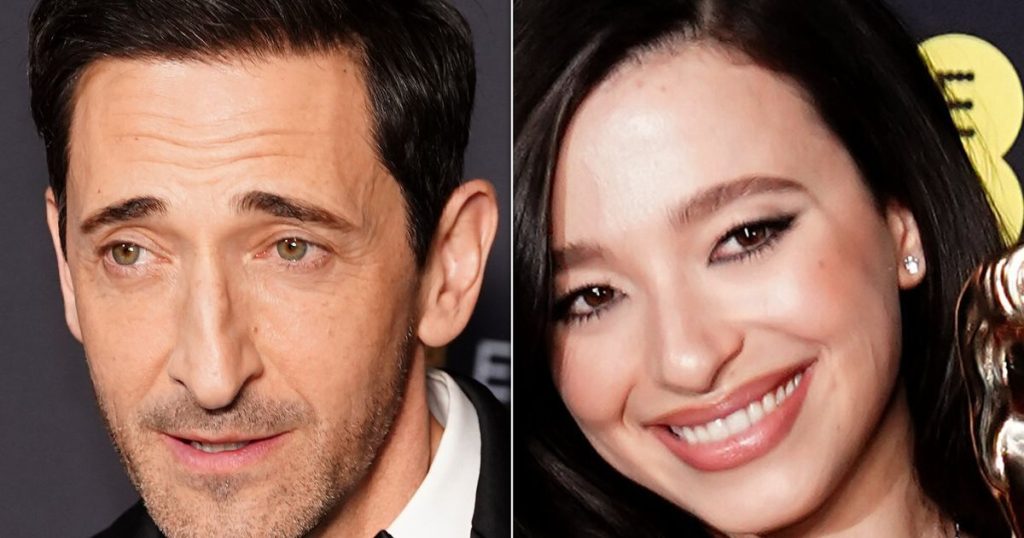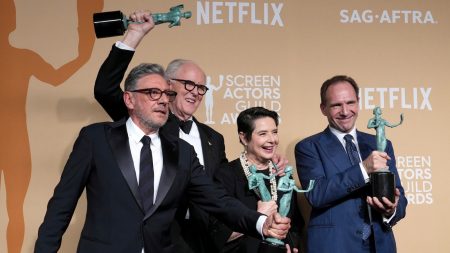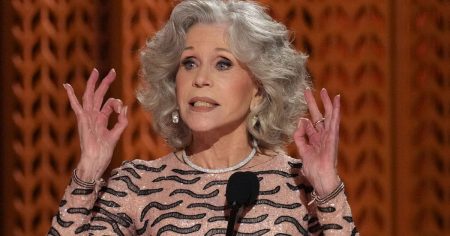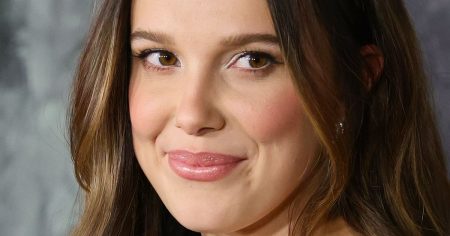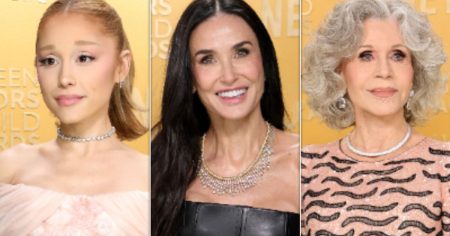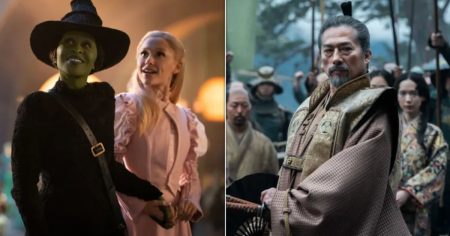Conclave and The Brutalist Dominate the 78th BAFTA Awards
The 78th British Academy Film Awards, held at London’s Royal Festival Hall, saw a competitive race where no single film dominated. However, two standout productions—“Conclave” and “The Brutalist”—each claimed four awards, showcasing their exceptional craftsmanship and resonance with audiences and critics alike. “Conclave,” directed by Edward Berger, emerged as the night’s biggest winner, securing the Best Picture prize. The film, which stars Ralph Fiennes as a cardinal navigating the intricate and politically charged process of electing a new pope, also won awards for Outstanding British Film, Best Adapted Screenplay, and Best Editing. Its success underscored the timeless appeal of stories that blend political intrigue with human drama.
Meanwhile, Brady Corbet’s “The Brutalist” matched “Conclave’s” tally of four awards, including Best Director for Corbet and Best Actor for Adrien Brody. Brody, who portrays a Hungarian-Jewish architect in postwar America, delivered a powerful acceptance speech that highlighted the film’s themes of unity and inclusion. “The Brutalist” also won prizes for Best Cinematography and Best Original Score, cementing its place as a technical and artistic triumph. The film’s win served as a reminder of cinema’s ability to tackle complex social issues with both nuance and emotional depth.
Diverse Winners and Controversies at the BAFTAs
The ceremony celebrated a wide range of talents and stories, reflecting the diversity of modern cinema. Mikey Madison won Best Actress for her gripping performance in “Anora,” a tragicomedy set in Brooklyn. Madison used her acceptance speech to advocate for respect and decency toward sex workers, a community often marginalized in society. Her words resonated deeply, aligning with the film’s themes of resilience and empowerment.
Another notable winner was Zoe Saldaña, who took home the Best Supporting Actress award for her role in “Emilia Pérez,” a genre-defying musical that has sparked both acclaim and controversy. Despite backlash over star Karla Sofía Gascón’s divisive social media comments, the film proved its staying power as an awards contender, also winning Best Film Not in the English Language. Director Jacques Audiard acknowledged the challenges faced by the production, expressing pride in the collaboration and dedication of his cast and crew.
The Best Supporting Actor prize went to Kieran Culkin for “A Real Pain,” a quirky comedy about mismatched cousins on a journey of self-discovery. The film also earned its writer-director, Jesse Eisenberg, the award for Best Original Screenplay. Culkin’s win added to the evening’s lighthearted moments, as Eisenberg humorously dedicated the screenplay award to his wife, who had doubted his chances of winning.
A Night of Glamour and Celebration
The BAFTAs are renowned for their unique blend of British charm and Hollywood glamour, and this year’s ceremony did not disappoint. Scottish actor David Tennant, resplendent in a kilt, kicked off the event with a rousing singalong of The Proclaimers’ “I’m Gonna Be (500 Miles),” setting a lively and inclusive tone. Stars such as Cynthia Erivo, Hugh Grant, Lupita Nyong’o, and Timothée Chalamet graced the red carpet, adding to the evening’s star-studded allure.
The ceremony also highlighted the British film industry’s commitment to inclusion and innovation. Warwick Davis, the beloved actor known for roles in “Star Wars” and “Willow,” received the BAFTA Fellowship, the academy’s highest honor, for his contributions to cinema and his advocacy for inclusivity. Davis, who founded a talent agency for short actors, delivered a heartfelt speech, calling the recognition “the best thing that’s ever happened to me—and I’ve been in ‘Star Wars.’” His words inspired applause and admiration from the audience.
Challenges and Triumphs in the Awards Season
This year’s BAFTAs took place against a backdrop of challenges, including the devastating Los Angeles wildfires and ongoing debates about diversity and representation in the film industry. The ceremony itself was not without controversy, as it addressed the backlash surrounding “Emilia Pérez.” Star Karla Sofía Gascón, who plays the titular transgender ex-cartel boss, faced criticism for past social media posts and did not attend the event. However, the film’s success at the BAFTAs, including its 13 Oscar nominations, demonstrated the academy’s willingness to separate artistic achievement from personal controversies.
The BAFTAs also offered a moment of reflection on the broader implications of storytelling. Adrien Brody’s speech for “The Brutalist” emphasized the need for empathy and inclusivity, themes that resonated with many in the audience. Similarly, Mikey Madison’s advocacy for sex workers highlighted the power of cinema to amplify marginalized voices. These moments underscored the BAFTAs’ role not only as a celebration of artistic excellence but also as a platform for meaningful dialogue.
Rising Stars and Timeless Legacies
The BAFTAs also celebrated emerging talents and enduring legacies. The Rising Star Award, voted on by the public, went to David Jonsson, known for his roles in “Industry” and “Rye Lane.” Jonsson’s win highlighted the growing recognition of his talent and the importance of public engagement in shaping the future of cinema. Meanwhile, Rich Peppiatt, writer-director of the Irish-language hip-hop drama “Kneecap,” won the award for Best British Debut, showcasing the innovative spirit of new voices in the industry.
In addition to honoring individual achievements, the ceremony acknowledged the technical wizardry that brings stories to life. Animated classics like “Wallace and Gromit: Vengeance Most Fowl” and blockbuster epics like “Dune: Part Two” were recognized for their visual and sonic excellence. The musical “Wicked” also dazzled, winning prizes for its stunning costumes and production design. These awards served as a reminder of the collaborative effort required to create cinematic magic.
The Road to the Oscars and Beyond
As the BAFTAs conclude, all eyes turn to the Academy Awards on March 10. This year’s Oscars race remains unusually unpredictable, with films like “Conclave,” “The Brutalist,” “Emilia Pérez,” and “Dune: Part Two” vying for top honors. The BAFTAs have historically served as a bellwether for Oscar success, but the diversity of winners at this year’s ceremony suggests that the competition is wide open.
The BAFTAs also demonstrated the enduring appeal of cinema in an era of streaming and shifting viewer habits. From intimate dramas like “Anora” to visually stunning blockbusters like “Dune: Part Two,” the films honored at the ceremony reflect the medium’s ability to tell stories that inspire, provoke, and unite audiences. As the industry continues to evolve, events like the BAFTAs remind us of the power of cinema to transcend borders and touch hearts.
In closing, the 78th BAFTA Awards were a celebration of storytelling in all its forms—a testament to the creativity, resilience, and inclusivity that define modern cinema. Whether through the political intrigue of “Conclave,” the emotional depth of “The Brutalist,” or the groundbreaking innovation of “Emilia Pérez,” the films honored at this year’s ceremony remind us why cinema remains such a vital and transformative art form.





